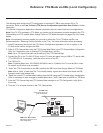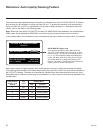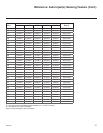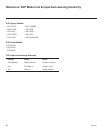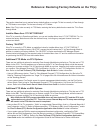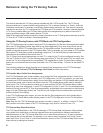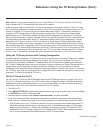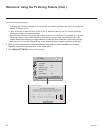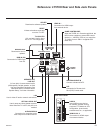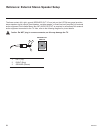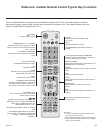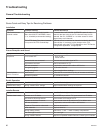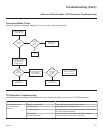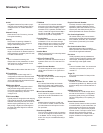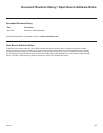
68
206-4257
Glossary of Terms
b-LAN
LodgeNet Interactive Corporation propri-
etary RF communication system used to
congure/control TV via RF distribution
system.
Channel Lineup
Channels set in the TV memory, via Auto
Tuning/manual editing.
Cloning
The process of capturing a Master TV
Setup and transferring it to a Target TV
using a USB memory device.
Commercial Mode
A mode of operation that provides a broad
range of commercial TV features based on
control (settings) provided by the PTC and/
or an MPI control device.
CPU
The TV’s Central Processing Unit.
Responsible for the presentation of video
and audio from content received via the
TV’s tuner or Aux inputs.
EBL
Embedded b-LAN module. See also b-LAN.
E-Z Installation
Enables splash screen image and TV
conguration and rmware le downloads
to selected TV models from a Pro:Centric
server. Managed and administered via the
Pro:Centric Admin Client.
EZ-Manager Wizard
Lodging model TV conguration wizard
that provides conguration options for
Pro:Centric operation as well as an option
for using a USB memory device to
congure a TV.
FTG Channel Map
Typically refers to a logical channel mapping
of physical RF channels. This allows digital
channels, like analog channels, to be tuned
without requiring the dash key. Also, chan-
nels (analog or digital) can be arranged in
any order that seems logical for customer
tuning/viewing.
FTG Mode
LG commercial TV mode that enables
decryption of Pro:Idiom Encrypted channels
and uses logical channel mapping. Imple-
mentation and TV operation is based on the
“owner” of the FTG Logical Channel Map—
the CPU or the EBL. LG’s proprietary PC
software is required for conguration.
Function Menu
Available via Installer Remote “MENU” key.
Indicates the TV is not in Pass-through
Mode. Restricts menu options to a subset
of the TV setup menus, allowing users to
retain functional control, while disabling
setup options.
Installer Menu
Denes commercial TV functionality based
on the parameters set.
LG Free-To-Guest (FTG)
Refers to a particular commercial mode of
operation within an LG TV. See also FTG
Mode.
Logical Channel Number
A number assigned to either a physical or
virtual channel number in a Logical Chan-
nel Map.
Major Channel Number
Typically, the RF channel number assigned
to a digital video stream.
Master TV
A TV whose Channel Map and Installer
Menu and TV setup menu settings have
been congured as a Master TV Setup for
cloning purposes.
Minor Channel Number
A sub-channel or program number as-
signed to the content embedded in the
digital video stream.
MPI
Multiple Protocol Interface. An MPI port
or, for some TV models, an MPI card slot
provides external control options for solu-
tion providers.
Pass-through Mode
The TV’s factory default mode of operation.
TVs can be congured for stand-alone use
or as Master TVs for cloning purposes,
and/or TVs may be controlled externally in
this mode.
Physical Channel Number
The major channel number assigned to
represent a specic 6 MHz RF band as
specied by either the broadcast or CATV
channel plan. See CEA (formerly EIA) or
NCTA specications for further information.
Pro:Centric Application
LG content delivery and communication
interface that provides interactive entertain-
ment, weather, amenities, etc. information
for end users. (Powered by Pro:Centric
server.)
Pro:Centric Admin Client
Web editor/content wizard provided for
service provider and customer conguration
of Pro:Centric application elements.
Pro:Idiom
Zenith proprietary security software that
unlocks access to premium content to help
assure rapid, broad deployment of HDTV
and other high-value digital content.
PTC
Protocol Translator Card. The commercial
controller (microprocessor) of the com-
mercial TV.
Target TV
A TV to which a Master TV Setup will be
transferred.
TV Setup Menus
Available via Installer Remote “MENU” key
in Pass-through Mode only. Menus provide
access to setup and functional features of
the TV.
USB Memory Device
A USB ash drive or USB storage device,
etc. that can be used for TV conguration
purposes (typically cloning or FTG Mode
via CPU conguration) or for updating TV
software.
Virtual Channel Number
An alias (virtual) channel number provided
in the data stream, by the broadcaster, of a
digital broadcast channel to be displayed
by consumer TVs in place of the physical
channel number. The major number is the
same as the original analog channel
number and the minor number is the nth
program available in that digital video
stream.



